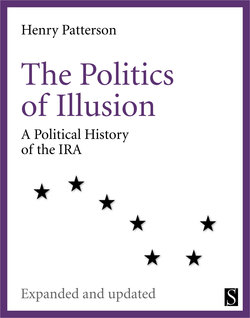The Politics of Illusion

Реклама. ООО «ЛитРес», ИНН: 7719571260.
Оглавление
Henry Patterson. The Politics of Illusion
Acknowledgements
Introduction
1 The Origins of Social Republicanism
Social Forces and the Irish Revolution
The Civil War and the Emergence of Social Republicanism
2 Republicanism in Inter-war Ireland
Land Annuities and Left Republicanism 1926-1932
Saor Éire and the ‘Lurch to the Left’
The Republican Congress Minus Workers and Protestants
3 In de Valera’s Shadow
Towards a Border War
Idealism and Sectarianism in the 1956 Campaign
4 A Limited Reassessment: The IRA after 1962
Regressive Modernisation
Towards an Army of the People
Civil Rights and Abstentionism
Fianna Fáil and the IRA
5 The Officials: Regression and Development, 1970-1977
The Freedom Manifesto – Social Republicanism in Crisis
Militarisation
Civil Rights Versus the National Question
The Officials and the ‘Hidden Ireland’
6 The Provisionals and the Rediscovery of Social Republicanism
‘Active’ Republicanism and Politics
Sinn Féin and the Anglo-Irish Agreement
The Armalite versus the Ballot-Box
7 The Tactical Use of Armed Struggle, 1990-1996
Armed Struggle and British Neutrality
A New Fluidity
A ‘High Risk’ Strategy
8 Ending the Union or Renegotiating It?
‘Sacrifice Simply for a Better Seat at the Table’
Blaming ‘the Brits’: Sinn Féin and Nationalist Ireland
9 The Peace Process: The Struggle to Defeat Unionism Continues
‘Stickies’ or ‘Sticks’
Chronology
Отрывок из книги
This book could not have been written without the assistance of those who agreed to be interviewed – Gerry Adams, Jack Brady, Anthony Coughlan, Francie Donnelly, Jimmy Drumm, Sean Garland, Cathal Goulding, Eoghan Harris, Seamus Harrison, Roy Johnston, Seamus Lynch, Tomás MacGiolla, Paddy Joe McClean, Dessie O’Hagan, Eamonn Smullen, Kevin Smyth and Jim Sullivan. I also received assistance from Mary McMahon. Eric Byrne and Ellen Hazelkorn gave me valuable criticism of what I had written on Official Republicanism in Dublin in the mid-1970s. Richard Dunphy gave me access to his major work on the history of Fianna Fáil up to 1948. Anthony McIntyre gave a critical perspective on the ‘peace process’. Rogelio Alonso allowed me to see the transcript of his interview with Bernadette McAliskey. The book as a whole benefited from many conversations with Paul Bew, particularly on the nature of Sinn Féin’s ‘modernisation’ since the mid-1970s. Carmel Roulston’s work on the recent history of the Communist Party of Ireland was of great value, as were her detailed criticisms of the first draft of the book, which much improved it. Neil Belton was a source of support to the development of my work on Ireland and provided an intelligent and detailed editorial control to the first edition. Stephen Hayward and Will Dady at Serif were invaluable in their support and enthusiasm for this new and expanded e-book edition.
None of the people I have mentioned has any responsibility for the positions and interpretations of the author.
.....
Behind the whimsical mystifications there was a clear attempt to establish the popular credentials of the key republican political leader, Eamon de Valera, whose ‘noble simplicity of life’ was contrasted with the Free State government: ‘the future aristocracy of Ireland … who are rolling around in limousines and acquiring fine residences’. Markievicz’s articles represent the first substantial attempt by republicans to use class discontents and a populist Gaelic version of Connolly to criticise the new state. The mystificatory and manipulative version of this strategy embodied in these writings would soon be contested by a more substantial version from within the IRA itself.
The linking of the annuities issue directly to the conditions and needs of the small farmers, the anti-big farmer ethos of the campaign and its aura and rhetoric of direct action to resist the bailiffs were not the forms in which de Valera wanted the issue to be articulated. The increasing involvement of the Fianna Fáil leadership in the annuities question was associated with a sustained attempt to drain it of any specific class dimension. Thus the Nation began to publish articles by lawyers proving the illegality of the payments to England. If they made any appeal to history, it was done in such a way as to include the majority of the agricultural population. In a typical article by a lawyer, the regional and class dimensions of O’Donnell’s revivalism is obliterated in a simple identification of ‘historic struggles’ and ‘the farmer’:
.....